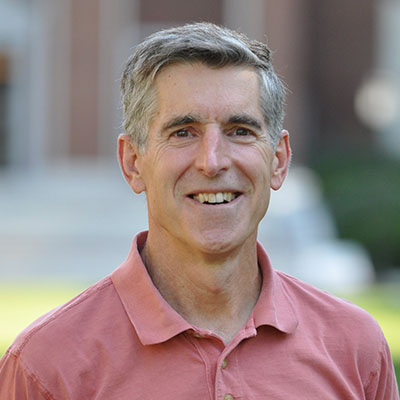
Timothy Weihs
Timothy Weihs, a professor of materials science and engineering, focuses on the fabrication, characterization and application of reactive, structural and functional materials. He is driven by an interest in developing an understanding of how novel processing and chemistries can deliver unique microstructures and properties for scientific studies and specific applications.
In the area of reactive materials, Weihs began by developing sputter deposited, reactive multilayer foils as model materials for studying phase transformations and as local heat sources for soldering and brazing components. In 2002, he took a three-year leave of absence from Johns Hopkins to commercialize the foils as co-founder and CEO of Reactive NanoTechnologies (RNT). After raising two rounds of venture funding and growing the company to the point of first commercial sales, he returned to active duty at Johns Hopkins in 2005. However, he stayed on part time at RNT as CTO until the company was sold in 2009. Weihs then expanded his studies of energetic materials into the ball-milling and compaction of composite reactive powders for bio-agent defeat and structural energetic applications. More recently, he has been working on the development of reactive powders for 3-D printing of conductive lines on flexible substrates.
In structural and functional materials, Weihs has leveraged thermal and mechanical processing methods to refine the microstructure of FeCo alloys for jet engine applications and the microstructure and chemistry of Mg alloys for armor and biomedical applications. Weihs also is using 3-D weaving and additive manufacturing to create novel architected materials with enhanced permeability, stiffness and damping for structural and biomedical applications.
Weihs is a member of the Materials Research Society; The Minerals, Metals and Materials Society; and a fellow of the American Society for Metals. His awards include an NSF Career Award, a 3M Young Faculty Fellowship, an R&D 100 Award, an Innovator of the Year Award, the TMS Application to Practice Award, induction into the National Academy of Inventors, a Fulbright Fellowship.
Weihs received a BA degree from Dartmouth College in 1983, then earned bachelor’s and master’s degrees in engineering from the Thayer School of Engineering in 1985. He received a doctor of philosophy degree in materials science and engineering from Stanford University in 1990 before conducting postdoctoral research at Oxford University in England and at the Lawrence Livermore National Laboratory in California. He joined the Johns Hopkins faculty in 1995. Weihs directed the Center for Leadership Development at Johns Hopkins from 2010 to 2017.
EDUCATION
- Ph.D. 1990, Stanford
- Bachelor of Science 1985, Thayer School of Engineering, Hanover, NH
- Master of Science 1985, Thayer School of Engineering, Hanover, NH
- Bachelor of Arts 1983, Dartmouth College
EXPERIENCE
- 2016 – Present: Lead, Metals Group in MEDE Program (16 tasks, across multiple institutions)
- 2016 – Present: Lead, Unspecified
- 2016 – Present: Advisor, Unspecified
- 2012 – Present: Co-Director, Metals CMRG in MEDE Program
- 2010 – 2017: Director, Center for Leadership Education
- 2010 – 2017: Director, Center for Leadership Education
- 2009 – Present: Consultant, Indium Corporation
- 2008 – 2010: Student Org Advisor (Non-Professional Org), Hopkins Undergraduate Engineering Society
- 2005 – 2009: CTO, Reactive NanoTechnologies, Hunt Valley, MD
- 2002 – 2005: Co-Founder and CEO, Reactive NanoTechnologies, Hunt Valley, MD
- 2000 – 2005: Associate Professor, Materials Science and Engineering, Johns Hopkins University, Baltimore, MD
- 1995 – 2000: Assistant Professor, Materials Science and Engineering, Johns Hopkins University, Baltimore, MD
- 1992 – 1995: Postdoctoral Researcher, Chemistry & Materials Science Department, Lawrence Livermore National Laboratory, Livermore, CA
- 1990 – 1992: NSF-NATO Postdoctoral Fellow, Department of Materials, Oxford University, Oxford, UK
- 1988 – 1989: Instructor, Materials Science and Engineering, Stanford University, Stanford, CA
RESEARCH AREAS
- Additive processing of architected materials and bio-scaffolds
- EXPERIMENTS
- Ignition
- Joining
- Local heat sources
- Mechanical deformation
- Micromechanical testing
- Microstructural stability
- Phase transformations
- Processing, characterization, and application of reactive materials
- Processing and characterization of structural metals
- Reactive multilayer foils
- THIN film deposition
AWARDS
- 2018: Teaching Fellowship
- 2017: Fellow of the Society
- 2017: Fulbright Fellowship
- 2015: Inductee
- 2013: TMS Application to Practice Award
- 2005: NanoTech 50 Award
- 2005: R&D 100 Award
- 2004: Innovator of the Year, Baltimore Tech Council
- 1997: 3M Corporation Young Faculty Fellowship
- 1997: NSF CAREER Award
- 1990: NSF-NATO Postdoctoral Fellowship
- 1989: SAMPE International Graduate Student Award
- 1988: MRS Graduate Student Award
- 1983: Richard P. Olmstead Prize